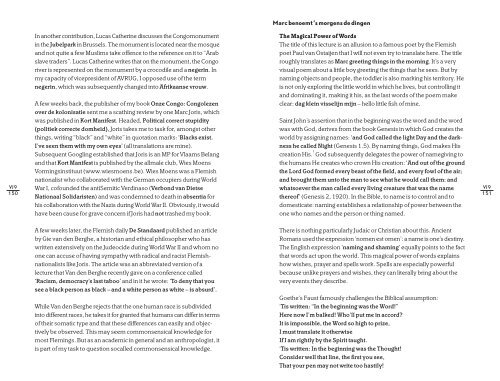elpicoroco@jonctions - Constant
elpicoroco@jonctions - Constant
elpicoroco@jonctions - Constant
You also want an ePaper? Increase the reach of your titles
YUMPU automatically turns print PDFs into web optimized ePapers that Google loves.
DEF>VJ9 publication 26-07-2006 17:50 Pagina 150<br />
VJ9<br />
150<br />
In another contribution, Lucas Catherine discusses the Congomonument<br />
in the Jubelpark in Brussels. The monument is located near the mosque<br />
and not quite a few Muslims take offence to the reference on it to “Arab<br />
slave traders”. Lucas Catherine writes that on the monument, the Congo<br />
river is represented on the monument by a crocodile and a negerin. In<br />
my capacity of vicepresident of AVRUG, I opposed use of the term<br />
negerin, which was subsequently changed into Afrikaanse vrouw.<br />
A few weeks back, the publisher of my book Onze Congo: Congolezen<br />
over de kolonisatie sent me a scathing review by one Marc Joris, which<br />
was published in Kort Manifest. Headed, Political correct stupidity<br />
(politiek correcte domheid), Joris takes me to task for, amongst other<br />
things, writing “black” and “white” in quotation marks: ‘Blacks exist.<br />
I’ve seen them with my own eyes’ (all translations are mine).<br />
Subsequent Googling established that Joris is an MP for Vlaams Belang<br />
and that Kort Manifest is published by the allmale club, Wies Moens<br />
Vormingsinstituut (www.wiesmoens.be). Wies Moens was a Flemish<br />
nationalist who collaborated with the German occupiers during World<br />
War I, cofounded the antiSemitic Verdinaso (Verbond van Dietse<br />
Nationaal Solidaristen) and was condemned to death in absentia for<br />
his collaboration with the Nazis during World War II. Obviously, it would<br />
have been cause for grave concern if Joris had not trashed my book.<br />
A few weeks later, the Flemish daily De Standaard published an article<br />
by Gie van den Berghe, a historian and ethical philosopher who has<br />
written extensively on the Judeocide during World War II and whom no<br />
one can accuse of having sympathy with radical and racist Flemishnationalists<br />
like Joris. The article was an abbreviated version of a<br />
lecture that Van den Berghe recently gave on a conference called<br />
‘Racism, democracy’s last taboo’ and in it he wrote: ‘To deny that you<br />
see a black person as black – and a white person as white – is absurd’.<br />
While Van den Berghe rejects that the one human race is subdivided<br />
into different races, he takes it for granted that humans can differ in terms<br />
of their somatic type and that these differences can easily and objectively<br />
be observed. This may seem commonsensical knowledge for<br />
most Flemings. But as an academic in general and an anthropologist, it<br />
is part of my task to question socalled commonsensical knowledge.<br />
Marc benoemt ’s morgens de dingen<br />
The Magical Power of Words<br />
The title of this lecture is an allusion to a famous poet by the Flemish<br />
poet Paul van Ostaijen that I will not even try to translate here. The title<br />
roughly translates as Marc greeting things in the morning. It’s a very<br />
visual poem about a little boy greeting the things that he sees. But by<br />
naming objects and people, the toddler is also marking his territory. He<br />
is not only exploring the little world in which he lives, but controlling it<br />
and dominating it, making it his, as the last words of the poem make<br />
clear: dag klein visselijn mijn – hello little fish of mine.<br />
Saint John’s assertion that in the beginning was the word and the word<br />
was with God, derives from the book Genesis in which God creates the<br />
world by assigning names: ‘and God called the light Day and the darkness<br />
he called Night (Genesis 1.5). By naming things, God makes His<br />
creation His. 1<br />
God subsequently delegates the power of namegiving to<br />
the humans He creates who crown His creation: ‘And out of the ground<br />
the Lord God formed every beast of the field, and every fowl of the air;<br />
and brought them unto the man to see what he would call them: and<br />
whatsoever the man called every living creature that was the name<br />
thereof’ (Genesis 2, 1920). In the Bible, to name is to control and to<br />
domesticate: naming establishes a relationship of power between the<br />
one who names and the person or thing named.<br />
There is nothing particularly Judaic or Christian about this. Ancient<br />
Romans used the expression ‘nomen est omen’: a name is one’s destiny.<br />
The English expression ‘naming and shaming’ equally points to the fact<br />
that words act upon the world. This magical power of words explains<br />
how wishes, prayer and spells work. Spells are especially powerful<br />
because unlike prayers and wishes, they can literally bring about the<br />
very events they describe.<br />
Goethe’s Faust famously challenges the Biblical assumption:<br />
‘Tis written: “In the beginning was the Word!”<br />
Here now I’m balked! Who’ll put me in accord?<br />
It is impossible, the Word so high to prize,<br />
I must translate it otherwise<br />
If I am rightly by the Spirit taught.<br />
‘Tis written: In the beginning was the Thought!<br />
Consider well that line, the first you see,<br />
That your pen may not write too hastily!<br />
VJ9<br />
151


